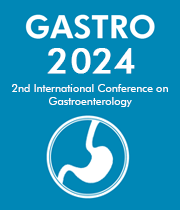Title : Unravelling the anti-cancer potential of kaempferide against hepatocellular carcinoma
Abstract:
Hepatocellular carcinoma affects more than 500,000 individuals annually, with a 5-year mortality rate of 95% or higher. By 2030, the number of deaths from liver cancer is projected to rise to more than one million. Kaempferide is a monomethoxyflavone that shows potent anticancer effects on multiple cancers both in vitro and in vivo. We evaluated the anticancer activity of Kaempferide against HCC using various in vitro and in vivo models. Kaempferide-induced dose-dependent cytotoxicity in 3 HCC cell lines (HepG2 IC50= 25μM, Huh7 IC50 = 18μM and N1S1 IC50 = 20 μM). Further, caspase-mediated apoptosis activation was also confirmed in vitro. Kaempferide showed a significant reduction in tumor size and tumor volume in vivo using an N1S1 orthotopically injected SD rat model. Histopathological evaluation by Hematoxylin and Eosin (H&E) staining confirmed that altered cells were significantly demolished in the Kaempferide-treated animals, which correlates with tumor reduction compared to the vehicle-treated group. Caspase-9 levels were also found to be increased in the treatment group. TGF-β 1, a crucial marker in the invasion and metastasis of liver cancer, was also downregulated in the treatment group. We report for the first time the potential of kaempferide as a promising alternative against HCC, which further warrants its clinical validation.
Audience Take Away:
-
As a passionate researcher in the field of cancer biology and phytotherapy, the presentation provides insight into the potential of phytochemicals in the management of liver cancer. The audience will understand the scope of phytomedicine and various molecular biology techniques that they can effectively incorporate in their research.
-
The audience including clinicians, scientists and research scholars will benefit from this presentation, as it emphasizes the current clinical management of HCC, its limitations, potential of phytomolecule, preclinical validation of a candidate drug, and various HCC models. The presentation helps to identify novel research scopes in the arena, clinical trials in the field of HCC, and novel therapy options, which will aid in professional improvement.
-
Indeed, oncology is a major field of research. Novel molecules are being evaluated extensively to explore new areas of cancer research. Therefore, this presentation emphasizing the potential of a phytomolecule as an effective therapeutic agent for HCC management will generate novel ideas in the research minds of scholars.
-
Since 2007, Sorafenib has been the only effective systemic therapy for advanced stage HCC until the approval of Levantinib in 2018 and Atezolizumab-Bevacizumab combination in 2020. But, the innate or acquired resistance against sorafenib started to exhibit within six months of the therapy. Despite the promising results of immunotherapy, owing to economic reasons, equitable access to and affordability of immunotherapy drugs are difficult, especially in developing countries such as India. This situation emphasizes the need for rationally developed safe-effective drugs for HCC management. Our presentation discuss preclinical validation and translation potential of a GRAS certified phytochemical against HCC.
-
Our presentation also covers the clinical aspects of Plant based medicine, which aware the audience regarding patents, clinical trial etc. Projecting natural products as safe-effective-affordable-available agents for the management of various



